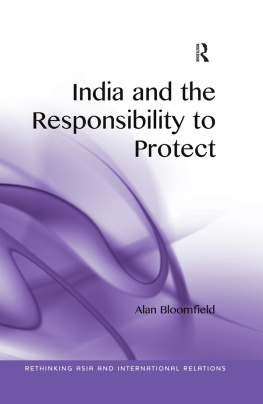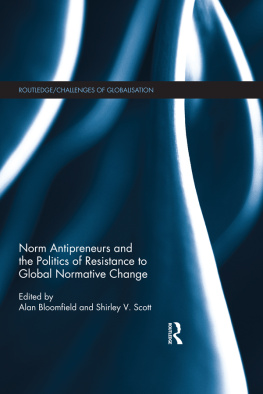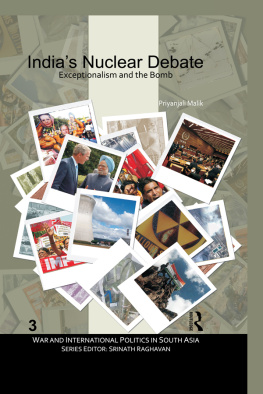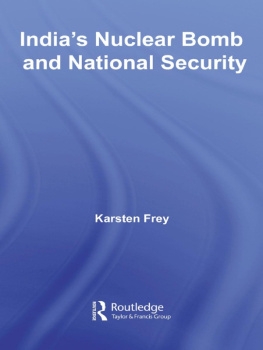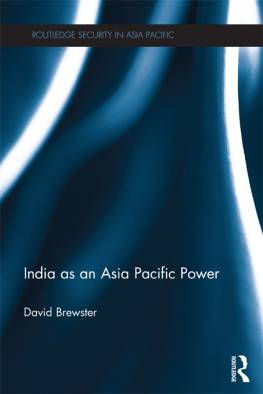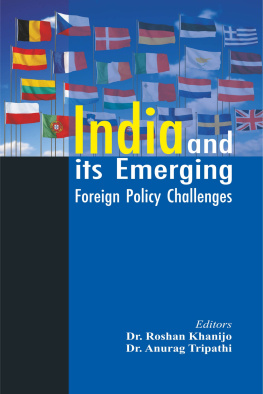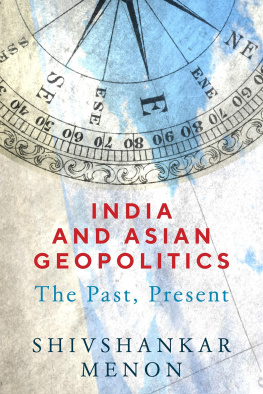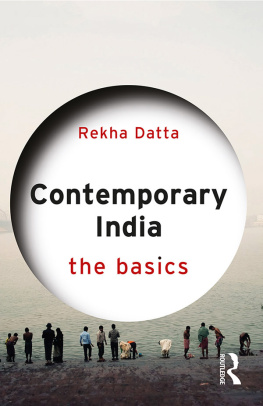India and the Responsibility to Protect
Rethinking Asia and International Relations
Series Editor: Emilian Kavalski,
Australian Catholic University (Sydney)
This series provides thoughtful consideration both of the growing prominence of Asian actors on the global stage and the changes in the study and practice of world affairs that they provoke. It offers a comprehensive parallel assessment of the full spectrum of Asian states, organisations, and regions and their impact on the dynamics of global politics.
The series encourages conversation on:
- what rules, norms, and strategic cultures are likely to dominate international life in the Asian Century;
- how will global problems be reframed and addressed by a rising Asia;
- which institutions, actors, and states are likely to provide leadership during such shifts to the East;
- whether there is something distinctly Asian about the emerging patterns of global politics.
Such comprehensive engagement not only offers a critical assessment of the actual and prospective roles of Asian actors, but rethinks the concepts, practices, and frameworks of analysis of world politics.
Other titles in this series
Managing Global Risks in the Urban Age
Singapore and the Making of a Global City
Yee-Kuang Heng
The ChinaJapan Border Dispute
Islands of Contention in Multidisciplinary Perspective
Edited by Tim F. Liao, Kimie Hara and Krista Wiegand
Risk State
Japans Foreign Policy in an Age of Uncertainty
Edited by Sebastian Maslow, Ra Mason and Paul OShea
Chinas New Governing Party Paradigm
Political Renewal and the Pursuit of National Rejuvenation
Timothy R. Heath
First published 2016 by Ashgate Publishing
Published 2016 by Routledge
2 Park Square, Milton Park, Abingdon, Oxon OX14 4RN
711 Third Avenue, New York, NY 10017, USA
Routledge is an imprint of the Taylor & Francis Group, an informa business
Copyright 2016 Alan Bloomfield
Alan Bloomfield has asserted his right under the Copyright, Designs and Patents Act, 1988, to be identified as the author of this work.
All rights reserved. No part of this book may be reprinted or reproduced or utilised in any form or by any electronic, mechanical, or other means, now known or hereafter invented, including photocopying and recording, or in any information storage or retrieval system, without permission in writing from the publishers.
Notice:
Product or corporate names may be trademarks or registered trademarks, and are used only for identification and explanation without intent to infringe.
British Library Cataloguing in Publication Data
A catalogue record for this book is available from the British Library
The Library of Congress has cataloged the printed edition as follows:
Bloomfield, Alan.
India and the responsibility to protect / by Alan Bloomfield.
pages cm. (Rethinking Asia and international relations)
Includes bibliographical references and index.
ISBN 9781409468721 (hardback)
1. IndiaForeign relations1984-. 2. IndiaForeign
relationsPhilosophy. 3. Humanitarian interventionCte dIvoire. 4. Humanitarian
interventionSyria. 4. Humanitarian interventionLibya. 5. Responsibility to protect
(International law)
DS449.B55 2016
341.5/84dc23
2015026590
ISBN 9781409468721 (hbk)
To my parents, John and Noelene, whose love and support have made this most rewarding of careers possible
The genesis of this book lay in what turned out to be, with hindsight, a revelatory conversation I had in late 2011 with a distinguished older colleague, Dr Theodore Gabriel. I was teaching a Middle East politics course at the overseas campus of Canadas Queens University located in the idyllic Herstmonceux Castle, near Eastbourne in the UK and I had been following the 2011 Libyan crisis closely with my students. It was early November 2011, less than two weeks since Colonel Gaddafis death, and I now realise I had in some ways become caught up in the wave of youthful exuberance my students displayed when this brutal dictatorship collapsed. I declared to Theodore over lunch that this event marked an important turning point in the fortunes of the responsibility to protect (R2P) norm a positive one and that it was also an important step along the road towards what I thought would be a more democratic future for the Middle East.
But Theodore was less sure. An acknowledged expert in religious studies, he had devoted decades to studying Islam and the Middle East. He is also an Indian, and while he has lived and worked in the UK for many years, he remained closely connected to his family back in India. He alerted me to the fact that Indians were not nearly so positive about events in the Middle East, especially in Libya, and I might want to look into this. I asked him why this was so wasnt India a true democracy? I recall saying on the assumption that being so (surely was another word I think I used) meant Indians perceived a dictators fall little differently to the way I viewed it. He responded by agreeing that India was democratic, for all its flaws, but this did not necessarily mean Indians viewed the fall of an Arab regime to a coalition of Western powers positively, or that democracy would necessarily be advanced in the wake of such events. He urged me to begin reading some of the Indian press reactions to Gaddafis downfall to get a better feel for the unique subcontinental worldview, shaped as it is by the long shadow of colonialism, as I recall him putting it. I questioned him a little further, but we both had to depart for afternoon classes soon. Still, the conversation had started me thinking.
I had never taken much more than a general interest in India until that point, other than knowing that it was a rising power (and one whose people shared, with many of my fellow Australians, a deep love of cricket). But I did take Theodores advice a few days later when the English weather turned bad. I spent my Saturday in the office instead of shopping in Brighton as planned, and because I didnt really feel like doing any real work I read the Indian press reports about Libya which had appeared in the days and weeks after Gaddafis death. And while it would be a gross exaggeration to say that what I saw in those articles precipitated a sort of road to Damascus moment, it is fair to say that this book would not have been written had I not spoken to Theodore (and, perhaps, if the skies had not turned ominous that weekend).
In those articles I saw a fundamentally different worldview on display. I am thoroughly Western. I grew up in Australia, I have travelled widely in Europe and North America in my youth, I have lived in Canada, and I was now in the Old Country, as Australians often put it. And while I had over the years become thoroughly familiar with the history of Western empire and the decolonisation era which followed it I had only read about it in books penned by Westerners. For the first time, however, I was reading about events which I was thoroughly familiar with I had followed the Libyan war closely, after all, in the Western press and in the pages of international relations journals (which are still dominated by Western authors) but these events were being interpreted very differently by Indians. These viewpoints were more sceptical of than celebratory towards the impact R2P was having on the world, and in particular, there were many dark prognostications of trouble to come in Libya.

